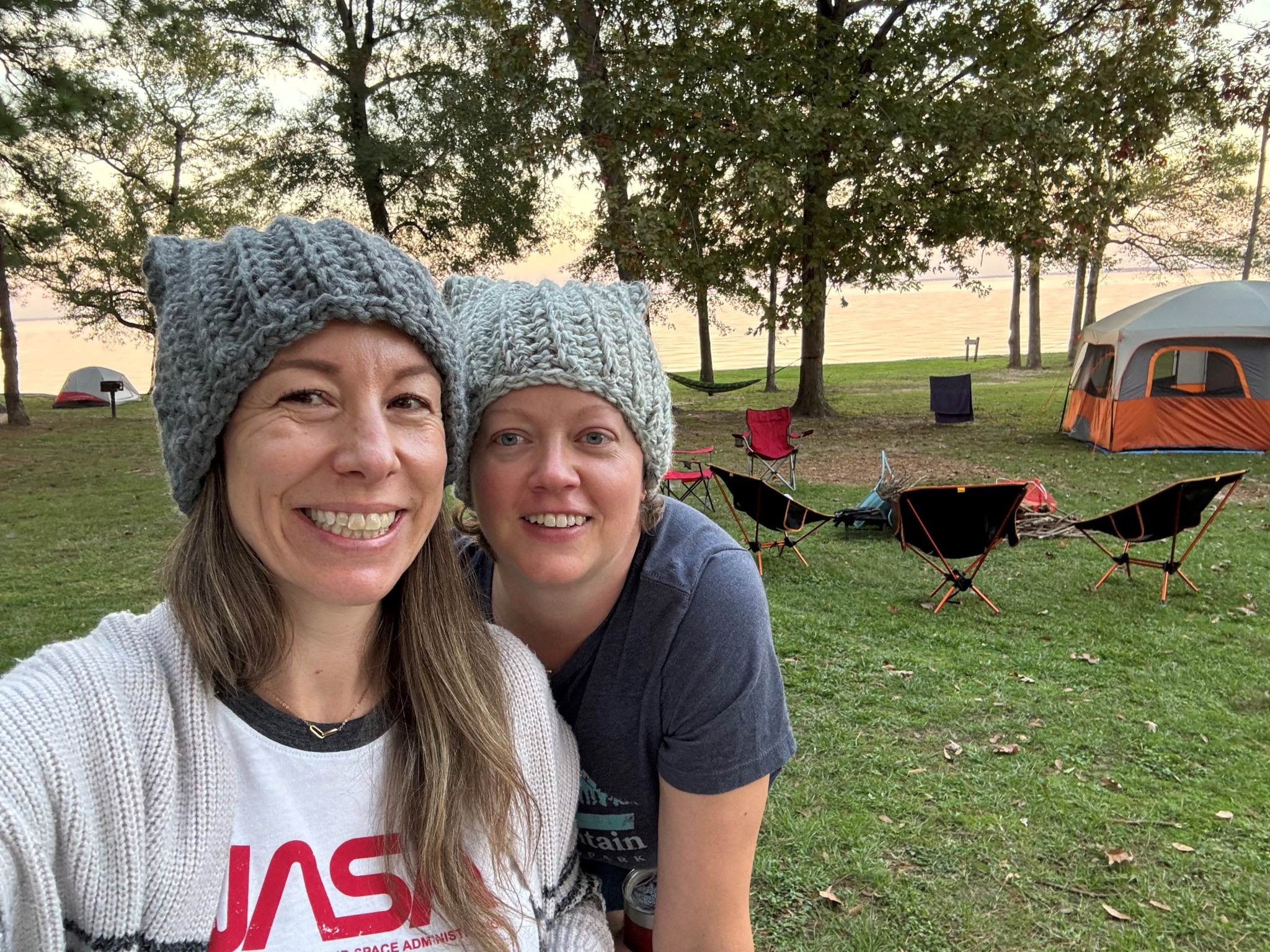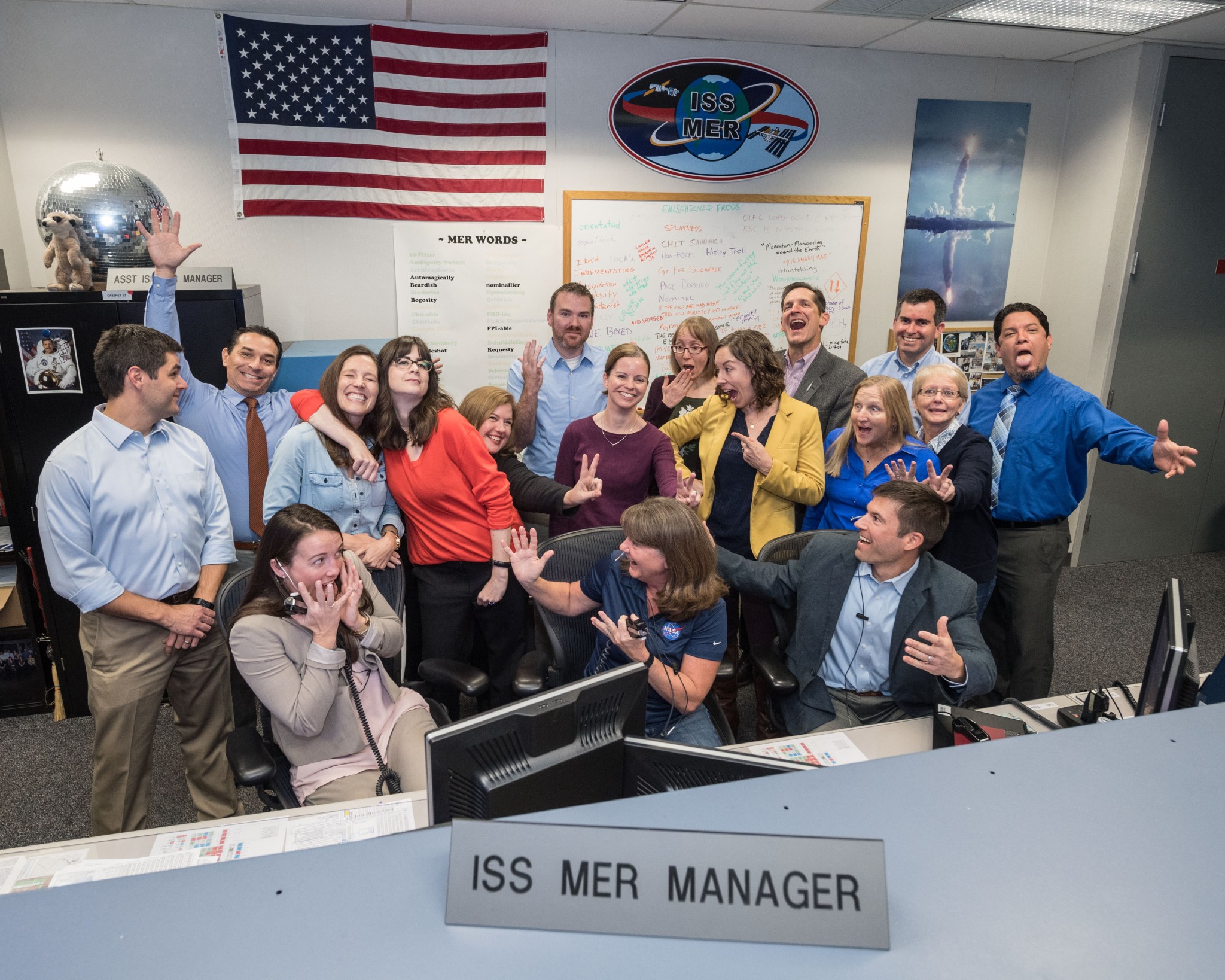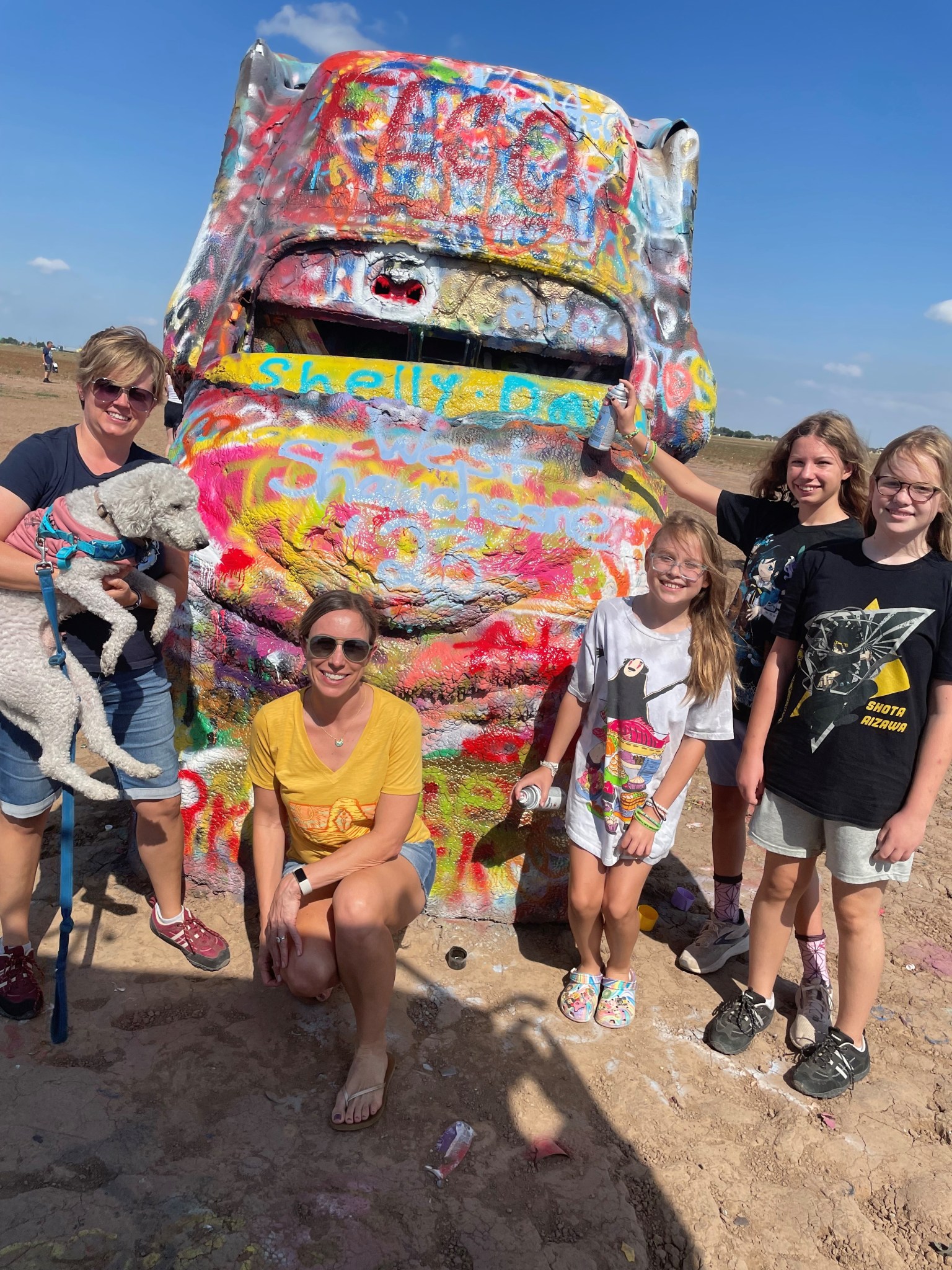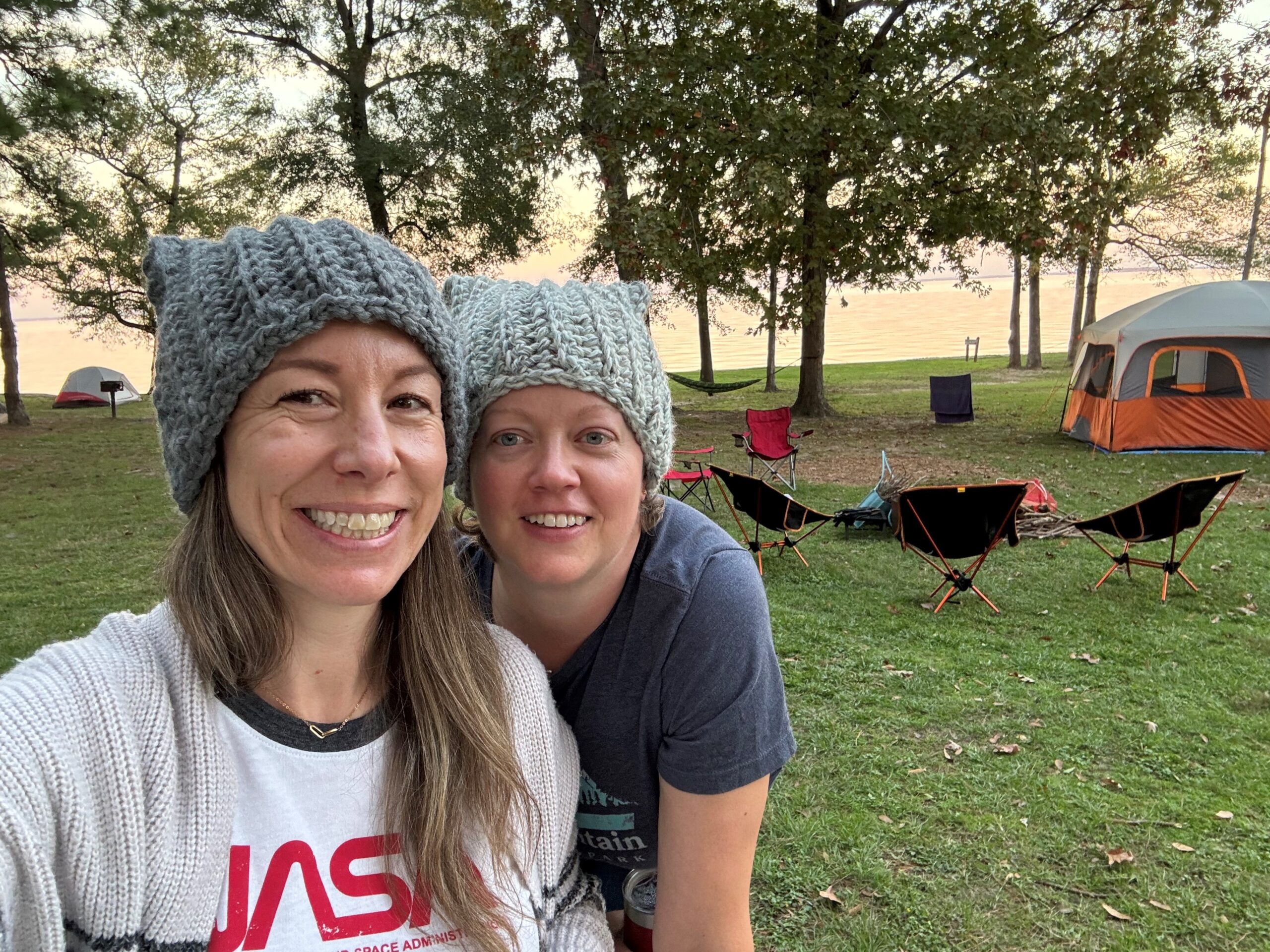Of all the lessons learned throughout her NASA career, the importance of relationship and personal integrity is one that has been repeatedly reinforced for Stephanie Duchesne, a Commercial Low Earth Orbit Development Program (CLDP) project executive.
“Each person you work with has their own unique perspectives and concerns, and in order to solve a problem or resolve a conflict, it is critical that you try and understand where they are coming from and build trust that you will do what you say,” she said. “That has been true at all levels of my career. I’ve learned that I never had to be the smartest person in the room to be able to help bring out the best ideas of the team, ask the right questions, and come up with effective and efficient solutions – that it is the collective mind and cohesion of the team that really creates the best solutions.”
 Stephanie Duchesne and her wife on a camping trip near Lake Livingston in Texas. Image courtesy of Stephanie Duchesne Based at NASA’s Johnson Space Center in Houston, Duchesne has been part of CLDP since 2021, but her NASA career spans more than 20 years. She started in 2003 as a contractor for KBR Wyle Services, supporting the International Space Station Program as a biomedical engineering flight controller. She worked with the flight control and medical teams to address real-time anomalies and support crewmembers through key milestones and also spent seven months in Germany to help the ESA (European Space Agency) establish its own biomedical engineering flight controller program.
Stephanie Duchesne and her wife on a camping trip near Lake Livingston in Texas. Image courtesy of Stephanie Duchesne Based at NASA’s Johnson Space Center in Houston, Duchesne has been part of CLDP since 2021, but her NASA career spans more than 20 years. She started in 2003 as a contractor for KBR Wyle Services, supporting the International Space Station Program as a biomedical engineering flight controller. She worked with the flight control and medical teams to address real-time anomalies and support crewmembers through key milestones and also spent seven months in Germany to help the ESA (European Space Agency) establish its own biomedical engineering flight controller program.
Duchesne then moved to the Environmental Control and Life Support System (ECLSS) engineering team, where she worked with the fledgling Commercial Orbital Transportation Services Program as an ECLSS integrator and managed the integration strategy between NASA and Russian ECLSS on the International Space Station. She also served as the lead system manager for emergency response, helping to develop the space station’s ammonia leak response and related hardware. Duchesne became a civil servant in 2017 when she was hired as a Mission Evaluation Room (MER) manager for the program’s Vehicle Office.
 Stephanie Duchesne (center right) and fellow International Space Station Mission Evaluation Room (MER) managers enjoy a lighthearted moment as a team. Image courtesy of Stephanie Duchesne Duchesne said being a MER manager was a standout experience. “It was both humbling and inspiring to come to work every day knowing that I could pull from the best minds in the space industry to find a solution to any problem that came our way,” she said. Still, she is hard-pressed to identify a favorite role or project among her varied experiences. “I’ve been fortunate to work in a lot of different areas at NASA and experience perspectives that have all provided challenges, successes, and lessons learned.”
Stephanie Duchesne (center right) and fellow International Space Station Mission Evaluation Room (MER) managers enjoy a lighthearted moment as a team. Image courtesy of Stephanie Duchesne Duchesne said being a MER manager was a standout experience. “It was both humbling and inspiring to come to work every day knowing that I could pull from the best minds in the space industry to find a solution to any problem that came our way,” she said. Still, she is hard-pressed to identify a favorite role or project among her varied experiences. “I’ve been fortunate to work in a lot of different areas at NASA and experience perspectives that have all provided challenges, successes, and lessons learned.”
In her current role with CLDP, Duchesne applies her extensive space station experience to leading NASA’s Space Act Agreement with commercial space station developer Starlab Space. “I love being part of the future of low Earth orbit and being able to provide these new companies with lessons learned from my years working station and connecting our partners with all the knowledgeable subject matter experts at NASA,” she said. “It feels rewarding to help the commercial industry stand on our shoulders to do new great things.”
Beyond her technical work, Duchesne strives to provide an example to her colleagues by being her authentic self in the workplace and honoring those who do the same. “I think it is so important for all of us to create safe spaces for each person to bring their whole selves to what we’re trying to achieve,” she said. “People’s unique life experiences and backgrounds provide rich space for connection and different perspectives on problems that NASA is trying to solve.”
Duchesne takes pride in NASA’s celebration of diversity in the workplace, and the value the agency places on all team members being able to live and work openly and authentically. “I feel fortunate to work in a community where I’m able to live this value in front of my children, and all the younger generations, so that it is no longer considered exceptional, but expected in their future,” she said.
Outside of work, Duchesne enjoys spending time with her wife – who also works for NASA – and their three children. “We love family road trips which give us time to connect and be together. Our dog Aston is the real boss of the house and joins us on all of our adventures.”
 Stephanie Duchesne (foreground, center) and her family during a visit to Cadillac Ranch in Amarillo, Texas, on one of their family road trips.Image courtesy of Stephanie Duchesne She hopes to share with her children and other members of the Artemis Generation a love for exploring the unknown and the confidence to achieve greatness in their own ways. “I look forward to them taking the reins, using the unique skills and techniques they have honed in today’s world – which is different than the one we grew up in,” she said. “I know this next generation will continue to accomplish great things for our world and beyond doing it their way, with open mindedness, acceptance, and integrity. I hope they remain inspired by human ingenuity and the amazing things we can accomplish when we work together, while holding reverence and awe toward all that we don’t yet know.”
Stephanie Duchesne (foreground, center) and her family during a visit to Cadillac Ranch in Amarillo, Texas, on one of their family road trips.Image courtesy of Stephanie Duchesne She hopes to share with her children and other members of the Artemis Generation a love for exploring the unknown and the confidence to achieve greatness in their own ways. “I look forward to them taking the reins, using the unique skills and techniques they have honed in today’s world – which is different than the one we grew up in,” she said. “I know this next generation will continue to accomplish great things for our world and beyond doing it their way, with open mindedness, acceptance, and integrity. I hope they remain inspired by human ingenuity and the amazing things we can accomplish when we work together, while holding reverence and awe toward all that we don’t yet know.”


